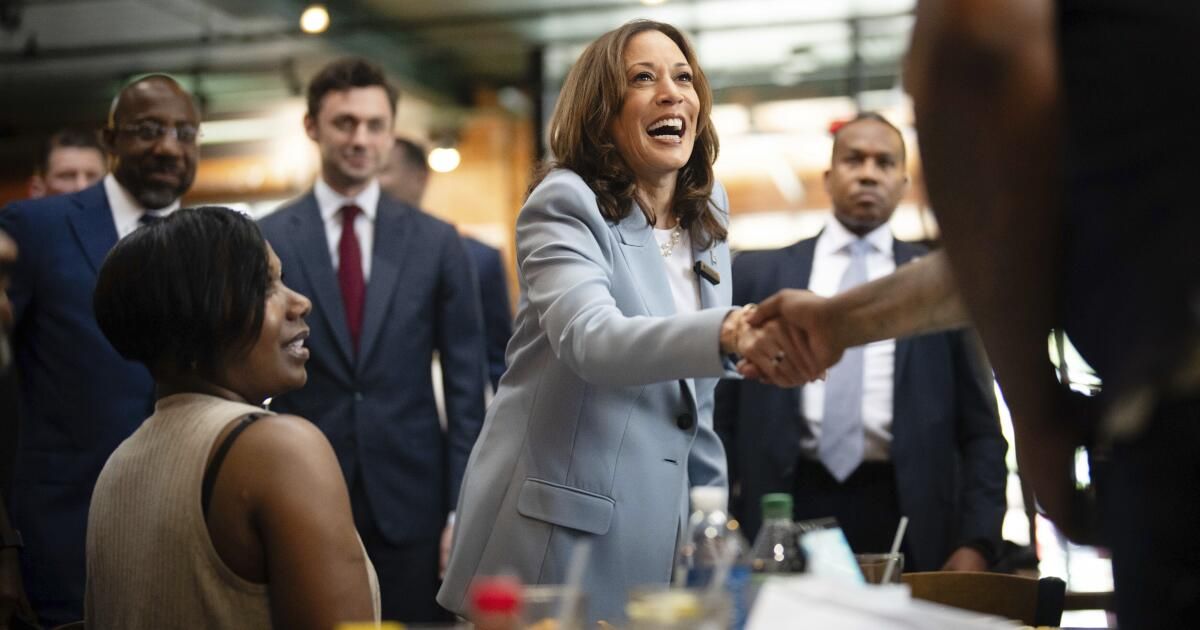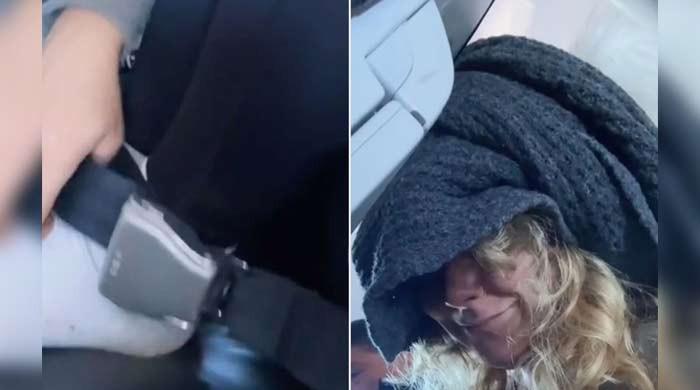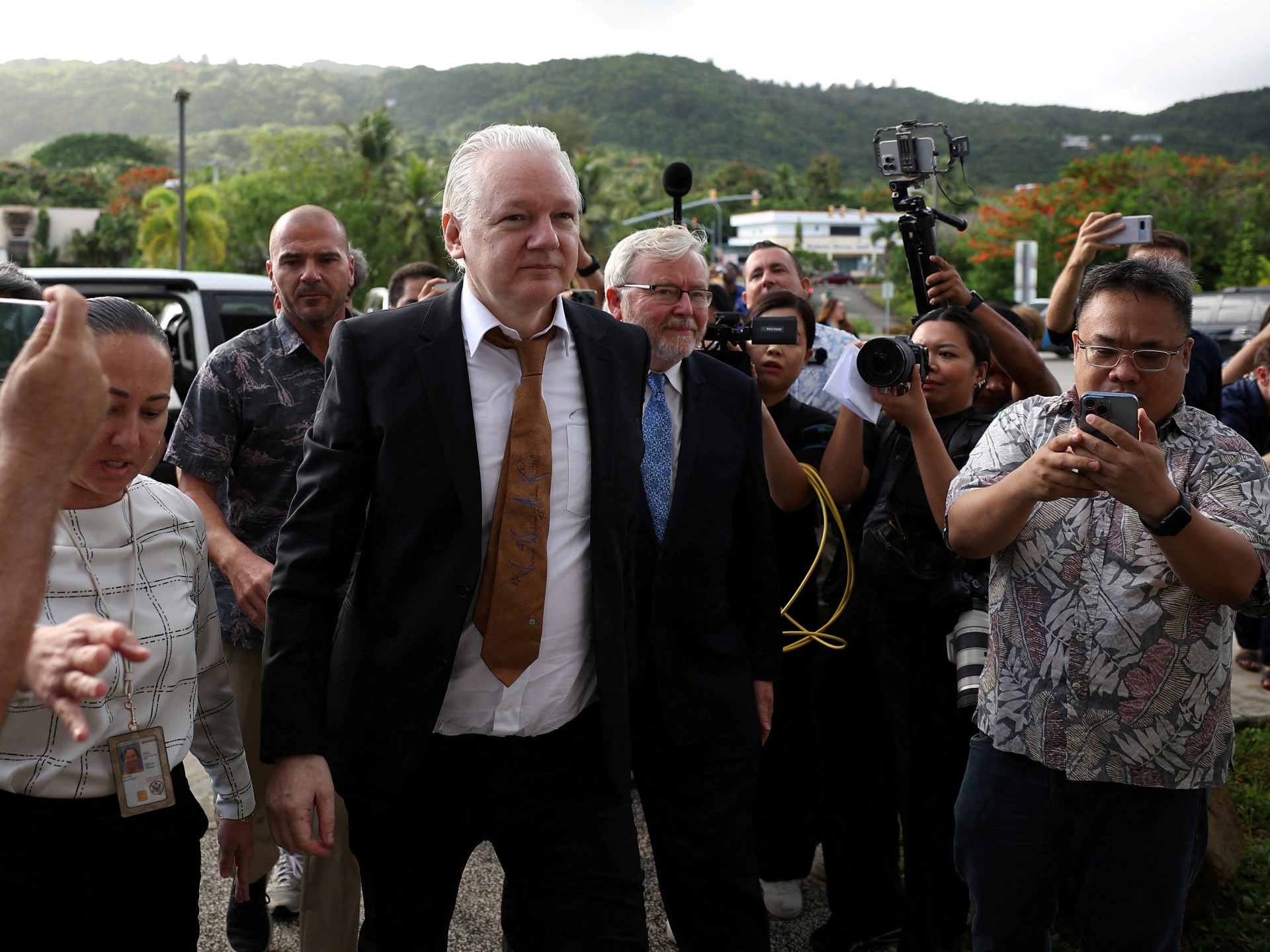Once again, Georgia is a battleground: Democrats and Republicans seem to agree on that.
“The road to the White House runs through this state,” Vice President Kamala Harris said at a July 30 rally in Atlanta.
Four days later, former President Trump repeated his sentiment with characteristic pessimism: “If we lose Georgia, we lose everything and our country goes to hell.”
A month ago, the prospect of a close presidential race seemed unlikely in this once-conservative Southern bastion, where President Biden secured a historic victory for Democrats in 2020.
This time, he was lagging in the polls, and his performance in an Atlanta debate against Trump in June raised troubling questions about his age and mental competency.
But when he stepped aside and endorsed Harris on July 21, Democrats faced a wave of popular enthusiasm.
Denise Hollingsworth says she's campaigning for Kamala Harris by phone and is “very encouraged to see America coming to life.”
(Jenny Jarvie/Los Angeles Times)
“Georgia is in play!” said Denise Hollingsworth, a retired attorney who moved to Georgia from New Jersey last year and began making phone calls for Harris when a new campaign office opened in East Point, Georgia.
Statewide, more than 35,000 new volunteers have joined the campaign in recent weeks to participate in “Kallin' for Kamala” phone banks, “Harris for the People” letter-writing parties and the “Kamala Coconut Campaignsing” campaign, according to a campaign spokesperson.
Hollingsworth said the experience had been so overwhelmingly positive that he believes Harris has a chance to win.
“I don’t know if I’m too wrapped up in all this or if I’ve just drunk the Kool-Aid,” she said, laughing. “I’m just so encouraged to see America coming to life and I’m so excited that it’s offering something different.”
Of course, many conservatives are similarly inspired by Donald Trump. And a small but significant portion of left-wing and independent voters have not been convinced by Harris’s broad themes of “freedom” and “We’re not going back!” or by the portrayal of her and her running mate, Minnesota Gov. Tim Walz, as “joyful warriors.” They want to know more about Harris’s agenda.
In Alpharetta, a rapidly developing and diversifying suburban area about 30 miles north of Atlanta where Democrats have gained ground in recent years, many voters interviewed by The Times, even those who have voted Democratic, expressed doubts about Harris and said they did not know enough about her.
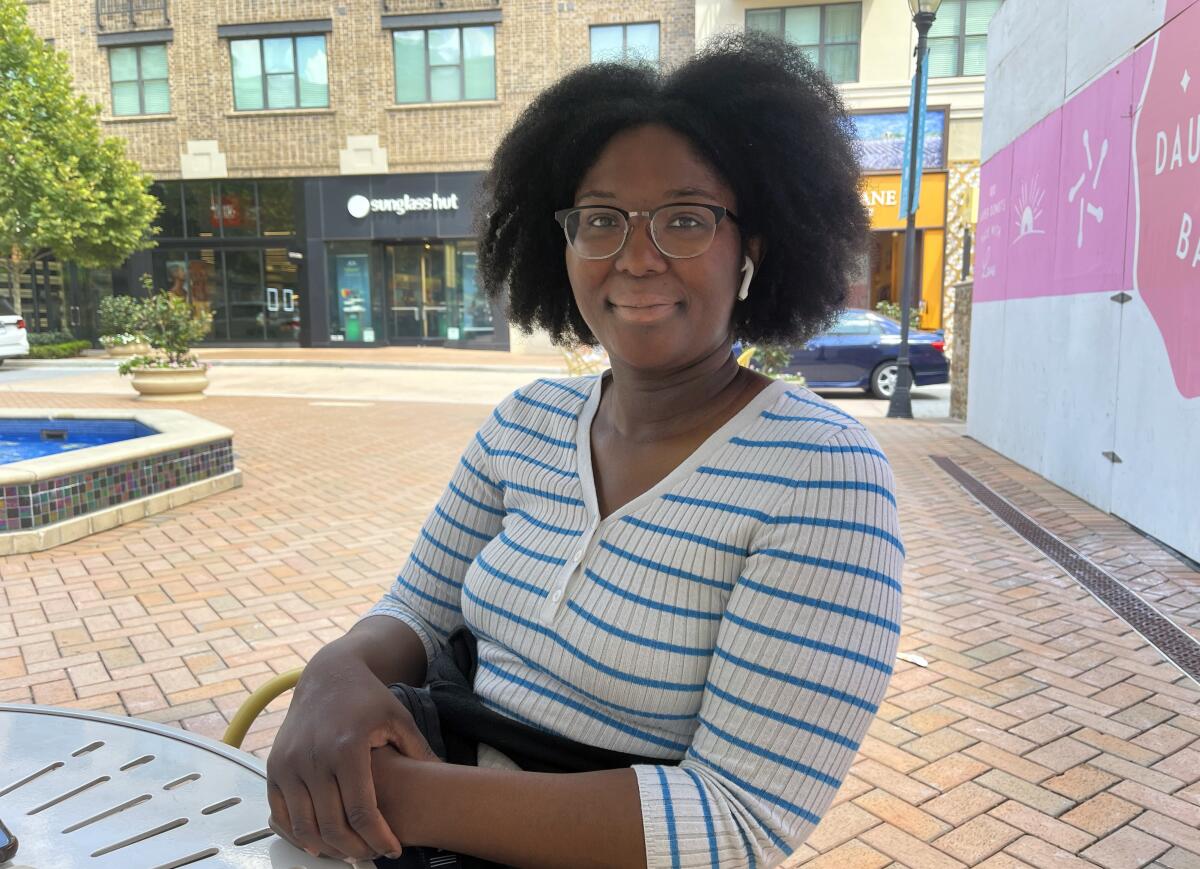
Tonycia Coe says she looks forward to learning more about Harris's positions.
(
Jenny Jarvie / Los Angeles Times)

Thomas Lee says he checked Harris's campaign website but found little about her views.
(Jenny Jarvie/Los Angeles Times)
“I know the memes, but I don't know her politics,” said Tonycia Coe, a 22-year-old student and retail worker, noting she had seen clips of Harris laughing on TikTok and references to coconut trees.
“Why hasn’t he given any interviews?” asked Shakil Ahmed, a former IT project manager from Bangladesh who voted for Biden in 2020 but is leaning toward Trump.
“It's a little strange that Kamala doesn't have much [her] “People can’t express their opinions on their website,” said Thomas Lee, a 43-year-old manager at a tech company. “You’re running for president and you can’t just express some clear opinions about where you stand on things.”
Harris is slowly revealing more details about her agenda. On Friday, at a rally in North Carolina, she outlined more details of her economic policy, promising to boost the construction of 3 million new housing units and a federal ban on food price gouging.
Persuading undecided voters is key for Democrats in a tight race. In polling averages compiled by FiveThirtyEight.com, Harris leads in Georgia by a fraction of a percentage point — a significant shift considering Trump’s comfortable 5.9 percentage point lead over Biden, but within the margin of error.
For the record:
13:16 August 20, 2024An earlier version of this article said Joe Biden's margin of victory in Georgia in 2020, by fewer than 12,000 votes, was the smallest of any state. Biden won Arizona in 2020 by 10,457 votes. Georgia's margin was the smallest in percentage terms, 0.2% versus 0.3% in Arizona.
Four years ago, Biden won Georgia by fewer than 12,000 votes, the second-narrowest voting margin of any state. (The Arizona race was decided by 10,457 votes.)
Biden’s victory here in 2020 — the first time Georgia voted for a Democratic president in nearly three decades — followed a decade of work by grassroots voter-mobilization groups seeking to capitalize on demographic shifts as growing numbers of Asian Americans, Latinos and Blacks moved to the state.
But the outcome also hinged on deep frustration with Trump among wealthy, college-educated and older voters in Atlanta's suburbs and surrounding areas.
“There are people in Georgia who are not locked into a partisan way of thinking,” said Jason Carter, a lawyer, former Democratic candidate for governor and grandson of Jimmy Carter, a former president and governor. In 2022, the younger Carter noted, Georgia re-elected Republican Gov. Brian Kemp and Democratic Sen. Raphael Warnock.
“The key challenge is for people to get to know her and actually earn their votes,” he said of Harris.
Just two and a half months into their case, Trump and Harris are struggling to connect with Georgia voters and claim the state's 16 electoral votes.
Harris’ campaign has said it has 170 staffers and 24 field offices, making it the largest operation in the state of any Democratic presidential campaign in Georgia history. In the first weekend after Biden dropped out, 2,500 volunteers turned out at more than 174 events. And that momentum hasn’t slowed: Over the weekend, more than 4,000 volunteers turned out across the state.
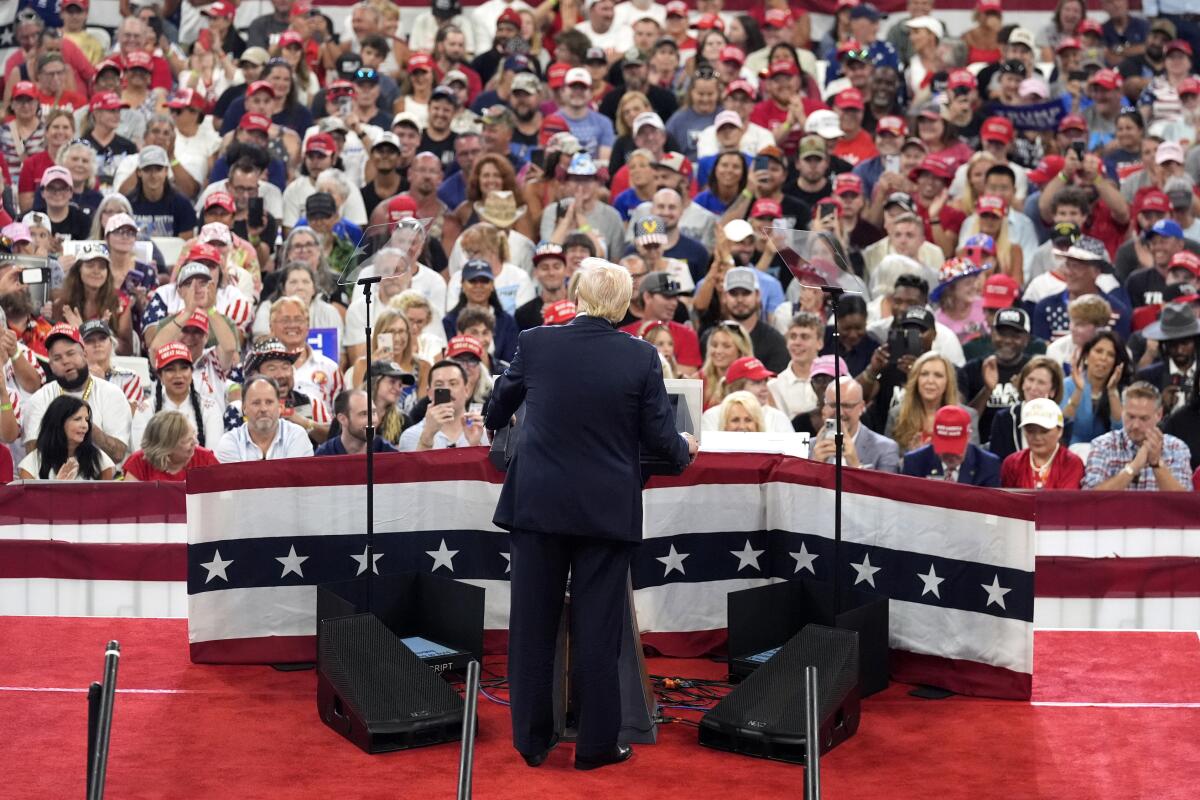
Donald Trump angered many Georgia Republicans on August 3 when he railed against Republican Governor Brian Kemp at a rally in Atlanta.
(John Bazemore/Associated Press)
Trump has more than 12 field offices in Georgia, a campaign spokesman said. The campaign has eschewed a large network of staff in favor of a new system called “Trump Force 47,” in which regional field directors gather volunteers to knock on doors in their neighborhoods. More than 10,000 volunteers have signed up for the effort in the past month, according to the campaign.
Gloria Barker, a retired school counselor in her 70s from the Atlanta suburb of Marietta, first began knocking on doors on behalf of Republicans when she joined in June.
At first, she said, she was afraid to knock on her neighbors’ doors, but when she ventured out after dinner each night, she was encouraged by the enthusiasm Trump generated, particularly among some voters who considered themselves Democrats or had voted for Biden in 2020.
“People want Trump back,” he said.
But Jason Shepherd, an adjunct professor of political science at Kennesaw State University and former chairman of the Cobb County Republican Party, said the party lacked voter outreach. Trump’s unfounded complaints about voter fraud had led Republicans to focus more on training poll workers than knocking on doors.
“They believe the election was lost at the polls because of fraud, not because they didn’t do enough to get people to the polls,” Shepherd said. “I get emails about signing up to be a poll watcher and attending state election board meetings, and that’s it. Compare that to four years ago, when the emails were about door-knocking training.”
Both campaigns are investing heavily in television advertising.
On July 30, Harris’ campaign launched a $50 million paid advertising offensive, and followed up last week with an additional $90 million in ads targeting undecided voters in Georgia and other battlegrounds.
On Saturday, his campaign said it had booked $370 million in television and digital ads for the fall, with some of that earmarked for Georgia.
The Trump campaign booked $37.2 million on new ads across seven states last week, the most it has spent this campaign cycle, according to ad tracking firm AdImpact. The bulk of the ad money — $23.8 million — went to Georgia.
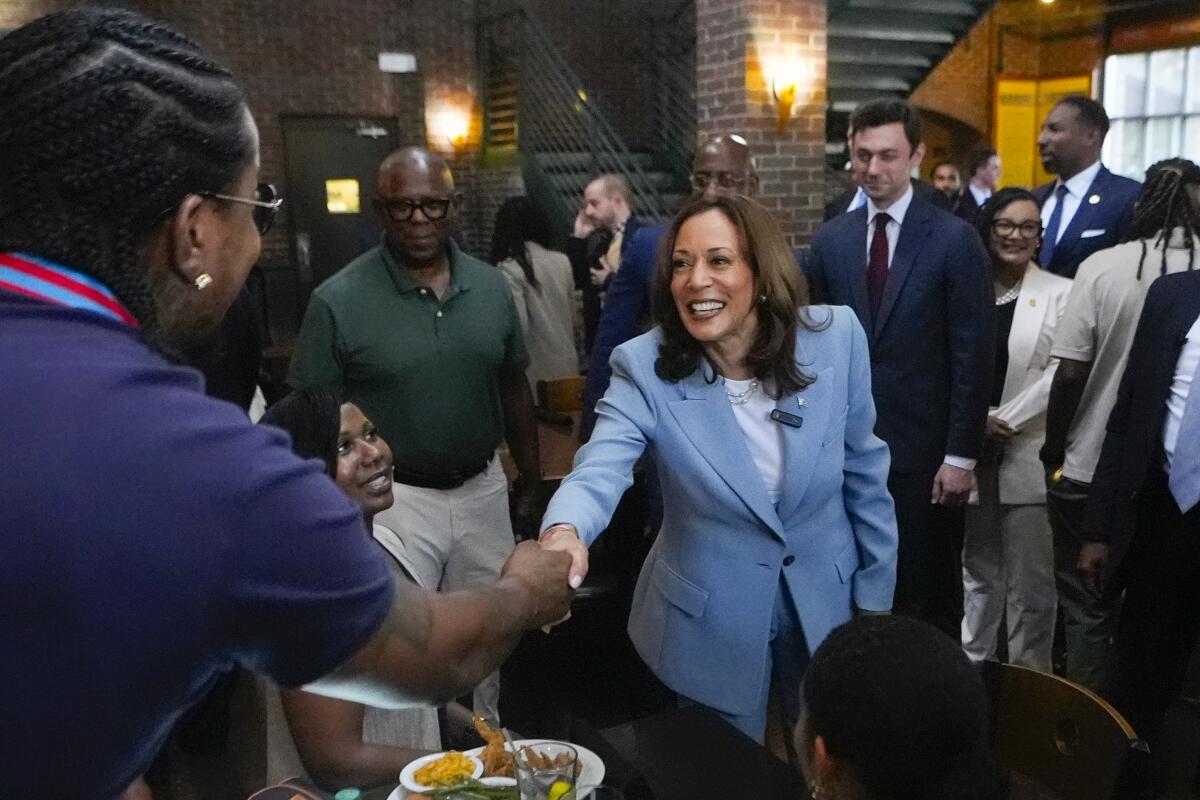
Harris greets voters last month at Paschal's, a historic Atlanta restaurant in the battleground state.
(John Bazemore/Associated Press)
But as Democrats rally around Harris, her Republican rival is facing the ire of many conservatives in Georgia for attacking Governor Kemp.
At his rally in Atlanta two weeks ago, Trump launched into an 11-minute tirade, berating “Little Brian” for his refusal to overturn Georgia’s 2020 election results. He called Kemp a “bad guy” and said that under his leadership, the state had “gone to hell” and Atlanta had become a “killing field.”
His outburst sparked a revolt in the state party, with many Georgia Republicans rallying against Trump in support of Kemp, who had defeated a Trump-backed rival in the 2022 Republican primary before handily beating Democrat Stacey Abrams.
“History has taught us that this type of message does not sell well here in Georgia, sir,” Secretary of State Brad Raffensperger wrote on X, formerly known as Twitter.
The governor refused to take Trump's bait.
“We’re going to use our political strategy to win Georgia despite the grievances of the past,” Kemp said at a recent meeting of Republican Party activists. “This is a state we can still win if we have all the mechanisms and things that are needed to win an election.”
But not all Republicans agree.
Among them is Geoff Duncan, a former lieutenant governor who has appeared frequently on CNN in recent weeks, trying to persuade moderate Republicans that the former president is a threat to democracy and that it is okay, even patriotic, to vote for a Democrat on Nov. 5.
Duncan said Harris’ experience as a prosecutor made her the perfect person to take on Trump, even though she is from California and has in the past advocated for what he called a “far-left” agenda. He said he was pleased she had moved away from positions she had taken in the 2020 primary on issues such as support for universal health care and banning fracking.
“I think this will pay off in November,” he said. “The 10% that remain in the middle will decide who will be the next president of the United States.”

